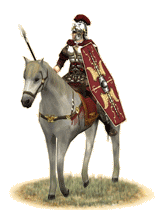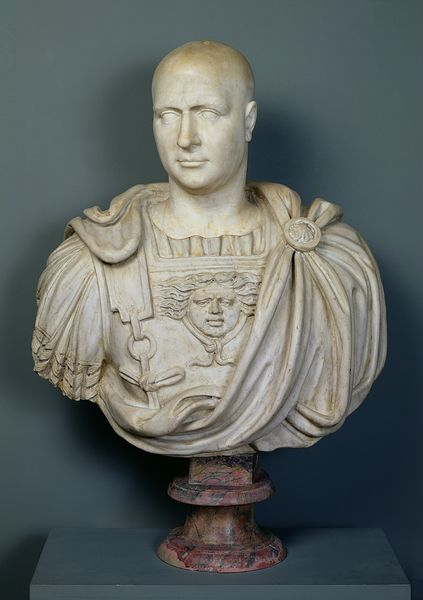The military tribune was a common, although not necessary step to rise in Roman politics. At the age of 16 you were considered a man in Rome. So welcome to adult hood and time to take on responsibilities in the name of the senate and people of Rome.
If you were a common citizen, called up to serve Rome, you’d be a front line Hastati (the lightest armed heavy infantry, yeah sounds a bit ironic) or a velite if you were dirt poor. However, if you were rich you would be in the equities (cavalry) or would be elected as a military tribune.
There were 6 tribunes available for each of the 4 legions (that was the standard levy at the time, which obviously grew). Now, how could one become a tribune?
Ohh it was easy. First be born right, aka a member of the Patrician order of Rome, or an Equite order member (though the very upper echelons of that class). Now this step wasn’t necessary but was seen as needed.
Initially from the establishment of the Republic of Rome this post while having important functional duties was indirectly elected as a sorts. Simply put: The Consuls of the year were the ones who used to pick all the tribunes (indirect, in case you had not picked up, because the consuls themselves were elected by the people [in this case the other patricians and equites because the Plebs did not matter to them]).
However, there was a nice change in the year 311 BCE, when the people got the right to elect 16 of the 24 tribunes, or 4 out of every 6 assigned to each legion. This was one of the various battles between the common folk (who would be more likely to support a tribune of their elections) than the other positions which represented the elites (the seeds of the battles between the optimates and populares were already in the making).
Now, what were the main functions of the Tribune?Basically, it was to show yourself to the public and senatorial orders. To be an ideal leader of the Roman Republic, one had to be willing to fight and show. Remember, Romans thought of politicians and generals the same, which is why Praetorians and Consuls commanded armies. As stated above, generally the rich and ruling class (even if elected by the people) were to be Tribunes. Why? Because most common folk could not afford a political career down the road. Also, since 2 of the 6 tribunes of each legion were assigned by the consuls, it was a really good political tool, to create future alliances and trade favours between various Patricians.
As a Tribune, they took turns by pairs leading the legion. This was during non-battle times, when the Consuls and more experienced men took over (no brainer). The tribunes were subordinate only to the consuls or appointed leaders of the army. They technically out ranked every centurion and soldier. So this was early practice of combat, leading, organisation and so on. They would be entrusted with leading the legion if the consul was not able to. Of course, for the Tribunes they also could learn ways on cementing a political alliance with the Consul. At other times, they would liaison between the consuls and the men, and undercover mutineers, trouble makers, etc.
Of course when it came to battle, they were expected to fight and lead by example. If a Tribune distinguished himself in the field of battle and earned the admiration of the soldiers, he will be noticed by the people and senate of Rome. That would be a good career boost.
 When fighting, Tribunes were mostly equites. So they would be fighting with the Cavalry forces of the legion.
Examples of Military Tribunes
When fighting, Tribunes were mostly equites. So they would be fighting with the Cavalry forces of the legion.
Examples of Military Tribunes
From the military duties of the tribunes, there are two incidents that showed a young tribune stepping up from what was the expected positions of his duty.
First was the Battle of Cynoscephalae. When the Roman right wing under Flaminus had defeated the unorganised Macedonian left, a tribune (who unfortunately we do not know who) made a move that changed the tide of battle. The organised Macedonian right wing was pushing back the Roman left. This Tribune took 2000 men and attacked the Macedonians from the rear. The Phalanx, due to its structure was unable to react to this new assault from a different direction. It collapsed and the battle was a convincing Roman victory.
The Second was the military tribune career of Scipio Africanus. As his father and uncle were consuls and were engaged against Hannibal, it was no surprise that Africanus was included as a tribune in his father’s legion (hey political powers granted to the consuls allowed it). He saved his father (and consul) at the Battle of Ticinus. He survived the Battle of Cannae and with the Roman Army in disarray, he led the 10,000 survivors back (yes those men were punished but not by Scipio). He also held up the flagging spirit of the Republic when he stopped a meeting of Roman nobles wanting to hire themselves out to foreign rulers. The patriotism, courage and leadership shown by Scipio, coupled with the long war allowed him to really climb up the political ladder of Rome rapidly and he forever was in the heart of the Roman public.
An example of the Tribunes doing more diplomatic but vital work
The Mutiny of Sucro. 8000 legionaries who assumed Scipio was near death, tried to instigate a mutiny. When the news was spread, Scipio had ordered his military tribunes to go to the mutineer’s camp, to find out the ring leaders. They did this in a calm manner to find the ring leaders (all 35 of them). When the mutineers who were invited to Scipio’s camp as his other armed legion marched out, they were once again met with professional courtesy and warmth from the Tribunes and camp staff. Once the men were drunk, all ring leaders were arrested. In the morning, the assembled men saw their leaders drawn up to be beaten and executed, whilst being surrounded by the armed legion of Scipio (who never really left the city).
A tough job that for the Tribunes, but their work did help end the mutiny with minimal bloodshed.
 One of the greatest Roman generals, Scipio Africanus had a distinguised career as a Tribune, showcasing his patrotism and loyalty to Rome, along with leadership. When commanding the legions of Hispania, he had his own Tribunes help him quell a mutiny.
One of the greatest Roman generals, Scipio Africanus had a distinguised career as a Tribune, showcasing his patrotism and loyalty to Rome, along with leadership. When commanding the legions of Hispania, he had his own Tribunes help him quell a mutiny.
So, the Military Tribune can be a post of importance as it really is the first platform on which a young man aspiring to climb up the Roman Political Ladder can showcase himself to the public, senate and soldiery of Rome. If done right, such a career can launch a man for a very successful career in Rome.
The next article will be talking about the first official position in the Curus Honorum, the Quaestor.
-Gaurav
Interested in the Greek World? Check out the Athenian Inspector’s blog on the Ancient Greek World!
Advertisements Share this:




